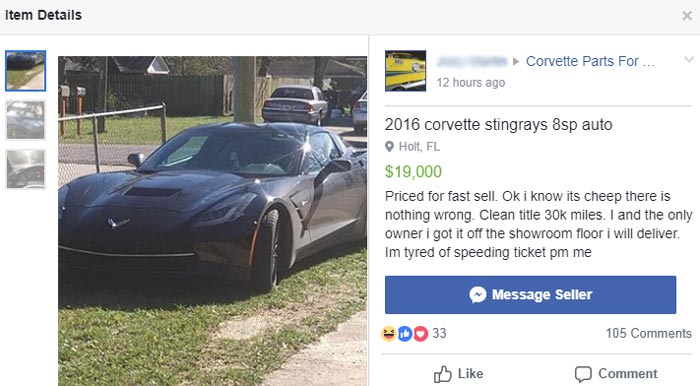When shopping for Corvettes online, scammers will usually try to lure in unsuspecting buyers by offering a Corvette at a really low price. We saw this one on Facebook this week for a 2016 Corvette Stingray priced at $19,000 and thought it would make a good post for showing how to sniff out the scam.
Many of these tips are common sense, and because Corvette owners may be a bit older, they may not have been exposed to some of the trickery that scammers employ. They are counting on that to separate you from your money.
We all want to be the one to find some absolute bargain of a car and scammers are counting on that emotional response for their ruse to work. The first thing buyers need to do it try to tap down those emotions and look at it with a fresh perspective.
This price for a 2016 Corvette Stingray is so low that you have to ask what’s wrong it with. The seller, of course, tells you there is “nothing wrong” and perhaps gives some other reason for the cheap sale. A 2016 Corvette at this price would only be sold legitimately if there was some kind of serious damage to it. So price is always your first indication on whether or not it is a legit ad.
Let’s say the price was $35,000 instead of $19,000. We know that a dealer’s wholesale price for a 2016 Stingray is probably in the mid $30s, so the alarm bells in your head may not be triggered immediately. So we look for any other indications.
Many scammers originate from overseas and therefore aren’t schooled in Americanized English and this goes for grammar and spelling. The first thing I saw after the low price was the spelling of “tyred” instead of “tired”. No American writer is going to make that mistake.
Also, they wrote “stingrays” instead of “Stingray”, misspelled “cheep” and he says that “I and the only owner” instead of “I am the only owner”. A poorly written ad should always be taken into consideration about the legitimacy of the car being sold.
Finally, beware of ads where the seller offers to deliver it without any preconditions because this is generally how the scammer collects his money. He may take it from a buyer’s payment or the down payment on the car, who then never hears from the seller again. The seller may also offer to pay for part of the shipping and directs the buyer to make the arrangements with a partner of the seller who is in on the scam.
The nice thing about cars listed on Facebook or the Facebook marketplace is that they have to be placed by an individual who is linked in the ad. If you click their name, look at their profile to see if they have other photos of the car in their timeline, or the post that says “I’ve been hacked!” This seller’s FB account was started last year and he has no friends at all which is a huge red flag.
FYI, I did reach out to the seller, asking if the car was still available. I have not heard back yet (and not really counting it anyway as I can no longer find the ad, and the seller read my message but has not followed up). If I do get an answer, I will let you know how that conversation goes!
I hope some of these tips are helpful to those who may be looking at purchasing a Corvette from an online seller. My advice is always to get on the phone with the seller and not only ask specific questions about the car, but also the location of where it can be seen, either by you or someone you hire to inspect if its far from you.
Related:
Found on Facebook: 2009 Corvette ZR1 Listed for $52,000!
Found on Facebook: Custom 1991 Corvette C4-1
Found on Facebook: Pearl Metallic 1979 Corvette Rolling on 24s
-




![[VIDEO] Dennis Collins Checks the Numbers on a 1970 Corvette LT-1 Before Taking It Home [VIDEO] Dennis Collins Checks the Numbers on a 1970 Corvette LT1 Before Taking It Home](https://www.corvetteblogger.com/images/content/uploads/2024/04/041724_1-218x150.jpg)
Appreciate it if you’d discuss “tire hop,” a condition quite evident when slowly turning while backing up in my 2015 Stingray. Chevy asserts that it causes no detrimental effect on the car. Yet, after 18K miles, the front tires need to be replaced.
Comments are closed.